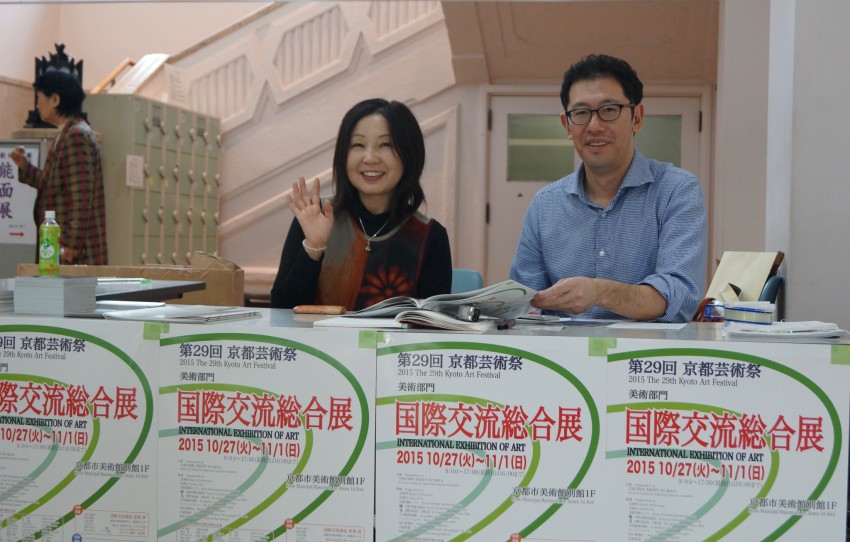Kyoto Art Festival’s International Exhibition of Art: The Entrance

This year’s International Exhibition of Art is really confusing with 101 artists spread out over five locations in Kyoto and staged over two months and with most artists only in one show each. What a logistics nightmare! Add a few primadonnas, and the volunteer organizers have had their hands full. On top of that, several artists are also in several other non-related shows in those two months. Autumn is the season for art in Japan.
The main show with the largest group of artists, who are also eligible for prizes and awards, are in the Annex of the Kyoto Municipal Museum of Art. (Being Japan, different maps and different documents will have different translations of the name, so the museum is also listed as the Kyoto City Museum of Art.) The annual group show is in a beautiful old building beside the new ROHM Theatre near the Heian shrine. Standing at the entrance to the hall was a figure by Tomoko Yokota that invited viewers and a title that invited happiness to rain down on her (Shiawase Orite Oide).

Melinda Heal might have returned to Australia, but her textile work was on prominent display. She loves to feature the tropical birds from her homeland.
KellyAnne Hanrahan was one of several artists from Brooklyn, New York who participated for the first time this year. The organizers were very careful to keep her three small paintings together and spread them out in a horizontal row on two pillars.
Kiyomi Yatsuhashi recently returned to the United States so she unable to attend this year’s exhibition. Before she left Kyoto, she was a regular contributor to the annual show. Her textile pieces this year were too small to hang in the window, but they were placed near the window so the sunlight could still shine upon the beautiful colours.
Congratulations to Robert Roesh! His Cermonial Platform series was the winner of the Kyoto Newspaper award. Maybe he will get a grant and be able to travel to Kyoto from the USA next year.
Small pieces of art, such as prints and other works on paper, are often displayed near the entrance. The pillars and ramp prevent people from backing up to view larger pieces but provide a chance to view smaller pieces up close. The Spirit and Siren series, a triptych of painted digital prints by Suzanne Reese-Horvitz, was one such work where you had to get in close to appreciate all the details. She, unfortunately, was unable to travel to Japan from the USA.
Omedetto (Congratulations)! Sara Araki was the winner of the Mainichi Newspaper award. This was another small piece and displayed on one of the pillars.
Silvina Raz was one of several Israeli artists who created ink paintings (sumi-e) on paper. This series was entitled, Dreamy Woods.
If I recall correctly, this sumi-e was by Erika Kusumoto. She decided to submit an ink painting although her specialty is painting with powdered pigments using a technique that originated in China but called nihonga in Japan. She also once was a student in Australia.
Blooming from Darkness was a series of ink paintings by Zvia Nahor, an Israeli artist.
Edith Naomi Rosenfeld’s ink painting of a Bedouin woman entitled, Over Joyed, received much acclaim from the head of the Kyoto Municipal Museum of Art. He singled her out for praise at the awards ceremony. (Sorry! I cannot remember the name of the prize she won.)
Jarmo Vellonen usually has this bit of wall near the entrance, introducing the start of the sculpture area. His sculpture has to fit his suitcase on his annual flight from Finland. I wonder what Customs thinks when they see his metal pieces on the X-ray machine.
This should give you a good idea what the entrance looks like even if you could not be there in real life.
















Leave a Reply